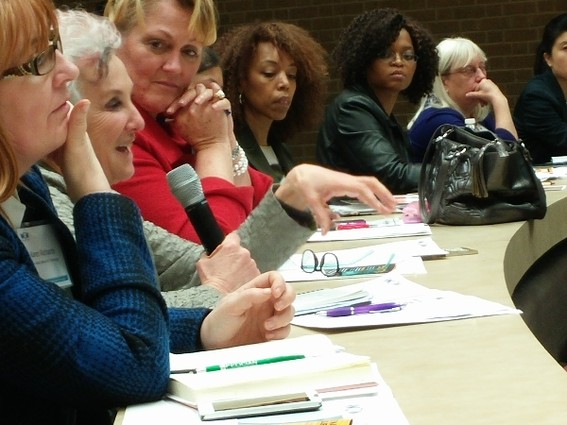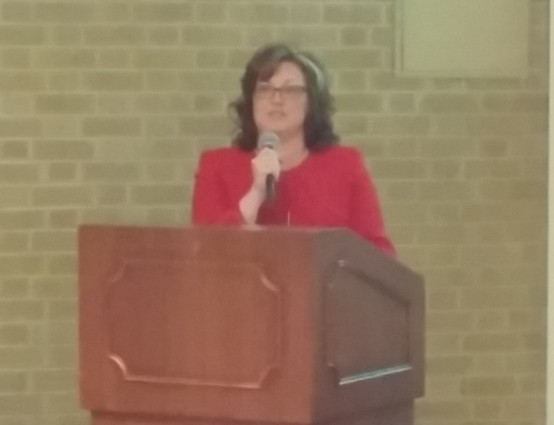Essex County Forum Urges Women to Pursue IT for Better Paying Jobs with a Future

Women can do anything when exposed to different career paths, and when they’re told that they can be anything.
A recent panel discussion at Essex County College (Newark) drove home the message that information technology is where the jobs are, and training programs are ramping up.
Amanda Andere, CEO and president of Wider Opportunities for Women traveled from Washington, D.C. to Newark on March 12 to kick off the event: New Jersey’s Forum on Women in Information Technology.
Using her own story as an example, Andere told the audience that, as a high school student in the 1990s, she had an internship in which she was surrounded by female computer programmers. At the time, she didn’t realize the rarity of this situation, and the exposure helped shift her career goal from being an attorney to using technology to change public policy.
IT skills can do more than anything to lift women out of poverty, particularly in Essex County, where single moms tend to gravitate to lower-paying service industries, according to panelist Amina Bey, executive director of the Newark Workforce Investment Board.

This mindset must shift, said Bey, so that both women (and young men) are encouraged to seek technological opportunities in an industry they like — be it healthcare, fashion or even the restaurant business. Technology is where the demand and good salaries are, she said.
Tech managers earn on average $120,000 per year, and those in STEM jobs earn 33 percent more than those in non-STEM jobs, said Grace Protos, regional administrator for the Women’s Bureau at the U.S. Department of Labor.
“We’re talking about building careers, building a life,” Bey added. “We have to stop saying, ‘Men, go get a CDL (commercial driver’s license) license and be a truck driver. Women, you go be a secretary or receptionist.’ The easy road doesn’t take you anywhere. You have to get outside your comfort zone. The easy road doesn’t pay your bills.”

Essex County College is now offering two-year degrees in technology skills. With a $2.7 million grant from the federal government, the school has created three associate-degree programs that are suitable for both mid-career changers and those starting out. They’re part of the college’s NAIL-IT program. “NAIL-IT” stands for “Newark Area Industry Linked Information Technology.” The degrees are in cybersecurity and networks, health information technology and software development.
In lieu of a two-year commitment, the school also offers shorter-duration certification programs that include the opportunity to take a test and be certified in technological skills, enabling students to enter the job market, said Barbara Hughes, NAIL-IT director at Essex County College.
But efforts need to start at the ground level, the panelists agreed, so that it will become second-nature to say, “I’ll just call the IT gal.”
“There is a need to increase STEM education, not only to college students but from kindergarten — to create that culture, so by the time they get to community college it will be an option for them,” said Dr. Gale Gibson, a former IBM executive who is president of Essex County College.
Dr. Gibson added that women comprise one-third of the first classes in the NAIL-IT programs at Essex County College, and that ratio should be better.
The panelists noted that IT careers don’t mean being trapped in a room behind a computer all day. They also emphasized the importance of including women in a culture of information technology, so that by the time they get to community college, IT will be an option for them.
“If women are not part of IT, we’re trying to solve complex problems with only half of the human brain. That’s not smart,” said Dr. Gale Tenen Spak, associate vice president of continuing and distance education at New Jersey Institute of Technology.
“When I was growing up,” she added, “we tended to believe that the reason for the bad numbers was that the geek gene is on the Y chromosome. We don’t believe that anymore. Women and girls are in fact the fastest adopters of new technology, and women who run high-tech companies actually do better by about 12 percent, and on less capital, than their male counterparts.”

Dr. Mary Gatta is a senior scholar with Wider Opportunities for Women and an adjunct professor at Rutgers University’s Department of Labor Studies and Employment Relations.
Gatta said that there is a subtly “chilly climate” in which women are treated differently from men. Much of this is unconscious behavior, and it’s important to look into that. Women of color, she said, often have even more challenges.
Bey mentioned that opportunities lay not just in IT, but also in manufacturing.
“People think manufacturing — you’re in a dark dungeon. No. There’s computer programming involved,” she said. “There are machines involved that are innovative. You’re not just in this windowless room. You’re not in a coal mine.”

Cynthia Vertucci, vice president, LCBE ITG, global business and technology solutions for Prudential Financial, said she was able to develop her career because the company developed her. IT, she said, is a field conducive to women because it is possible to work seamlessly from home.
“I got a network. I got a CIO to mentor me,” said Vertucci. “When you’re in technology, you don’t need to know all the answers. You need to know who you can go to.”
Elsewhere: The Newark One-Stop Career Center offers assistance with IT job placement and skills training for displaced workers, and NJIT participates in upSkill, a program that provides training in IT and STEM skills for unemployed professionals and veterans.

